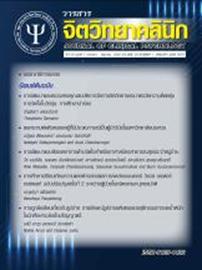Development and psychometric evaluation of the Psychological Flexibility Scale for Adolescents: A pilot study
Main Article Content
Abstract
Objective : To develop and examine psychometric properties of the Psychological Flexibility Scale for Adolescents.
Materials and methods : Literature review was conducted in order to develop items of the Psychological Flexibility Scale for Adolescents (PFA). Then, content validation of the PFA was reviewed by 3 experts, using index of item-objective congruence (IOC) and content validity index (CVI). Subsequently, the reliability of the PFA was investigated through 49 respondents, using Cronbach’s α coefficient.
Results : The PFA consists of 6 factors, including cognitive defusion, acceptance, flexible attention to the present moment, self-as-context, values, and commitment action. The results of this study showed that the content validity index (CVI) of the PFA ranged from .74 – 1 and the Cronbach’s α coefficient
ranged from .65 - .81 for 6 subscales.
Conclusion : The content validity and reliability of the scale are acceptable or above, which is adequate for study further psychometric evaluation.
Article Details

This work is licensed under a Creative Commons Attribution-NonCommercial-NoDerivatives 4.0 International License.
เรื่องที่ลงตีพิมพ์ในวารสารจิตวิทยาคลินิกแล้วถือเป็นลิขสิทธิ์การเผยแพร่โดยวารสารจิตวิทยาคลินิกแต่เพียงผู้เดียว การตีพิมพ์หรือเผยแพร่ซ้ำในที่อื่นต้องได้รับอนุญาตจากกองบรรณาธิการวารสารฯ
References
ยูนิเซฟ ประเทศไทย. (2559). รายงานสถานการณ์ปัญหาเยาวชนและวัยรุ่นในประเทศไทยปี 2557-2559. สืบค้นเมื่อ 19 เมษายน 2560, จาก http://www.unicef.or.th/SitAnVideo2016/sitan_executive_summary.docx.
วนิชา น้อยผล และนิภาพรรณ พรมอุทัย. (2560, สิงหาคม). ผลการบำบัดผู้ป่วยโรคซึมเศร้าด้วยแนวคิด Acceptance and Commitment Therapy (ACT) การศึกษาเชิงทดลองทางคลินิกแบบนำร่อง. ประชุมวิชาการโรงพยาบาลสวนปรุง, เชียงใหม่.
สถาบันสุขภาพจิตเด็กและวัยรุ่นราชนครินทร์. (2561). สถิติการให้บริการให้การปรึกษาสายด่วน1323 ประจำเดือน มีนาคม 2561. สืบค้นเมื่อ 27 มีนาคม 2561, จาก http://www.
smartteen.net/main/index.php?mode=know&group=20&id=1144&date_start=&-date_end=.
อุดมศักดิ์ แซ่โง้ว, พลเทพ วิจิตรคุณากร และสาวิตรี อัษณางค์กรชัย. (2559). ข้อเท็จจริงและตัวเลข: เครื่องดื่มแอลกอฮอล์ในประเทศไทย. สงขลา: ศูนย์วิจัยปัญหาสุรา.
Batink, T., Jansen, G., & Peeters, F. (2015). Nieuwe generatie gedragstherapie, nieuwe generatie meetinstrumenten: Een o v e r z i c h t v a n b e s c h i b a r e
ACT-meetinstrumentem [New generation behaviour therapy, new generation assessment measures: A review of currently available assessment measures].Tijdschrift voor Psychiatrie, 57, 739-748.
Bond, F. W., Hayes, S. C., Baer, R. A., Carpenter,K. M., Guenole, N., Orcutt, H. K., … Zettle,R. D. (2011). Preliminary psychometric properties of the Acceptance and Action Questionnaire-II: A revised measure of psychological inflexibility and experiential avoidance. Behavior Therapy, 42, 676-688.
Greco, A. L., Lambert, W. & Baer, A. R. (2008). Psychological inflexibility in childhood and adolescence: Development and evaluation of the Avoidance and Fusion Questionnaire for Youth. Psychological Assessment, 20(2), 93-102.doi: 10.1037/1040-3590.20.2.93.
Halliburton, E. A. & Cooper, D. L. (2015). Applications and adaptations of acceptance and commitment therapy (ACT) for adolescents. Journal of Contextual Behavioral Science, 4(1), 1-11.doi:10.1016/j.jcbs.2015.01.002.
Hayes, C. S., Strosahl, D. K. & Wilson, G. K. (2012). Acceptance and commitment therapy: The process and practice of mindful change (2 edition). New York: Guilford
Press.
Hayes, L. L. & Ciarrochi, J. (2015). The thriving adolescent: Using acceptance and commitment therapy and positive psychology to help teens manage
emotions, achieve goals, and build connection. Oakland, CA: Context Press.
Rochefort, C., Baldwin, S. A. & Chmielewski, M. (2017). Experiential avoidance: An examination of the construct validity of the AAQ-II and MEAQ. Behavior Therapy,
49(3), 435-449.
Rolffs, J. L., Rogge, R. D., & Wilson, K. G. (2018). Disentangling components of flexibility via the Hexaflex model: Development and validation of the Multidimention
Psychological Flexibility Inventory (MPFI). Assessment, 25(4), 458-482. doi: 10.1177/1073191116645905.


